Kyrgyzstan's presidential election: a choice without alternatives
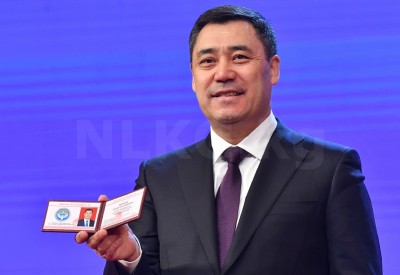
Yet again a candidate from the government has won the presidential election in Kyrgyzstan
The early presidential election was held in Kyrgyzstan on January 10, 2021. Sadyr Japarov, 51, who had been serving an 11-year prison sentence only a few months earlier for hostage-taking, won the election.
Experts and political analysts joke that Sadyr Japarov can easily be listed in the Guinness Book of Records as the politician who was the fastest to overcome the path from a prisoner to the head of state. So what is his phenomenon? And why the government candidate always wins elections in Kyrgyzstan. We will try to find out.
Parliamentary elections were held in Kyrgyzstan on October 4, 2020, with two government parties winning a majority of seats in the Jogorku Kenesh: "Birimdik" and "Mekenim Kyrgyzstan". The elections were accompanied by numerous irregularities and bribery by those parties, which led to a mass meeting on October 5, 2020. We wrote about this in detail in the first part of the article titled "Third time making the same election mistake" (http://nlkg.kg/ru/politics/elections-2021/tretij-raz-na-te-zhe-vybornye-grabli).
Dissatisfied with the election results, tens of thousands of Kyrgyzstani citizens marched on Bishkek's central square to demand the cancellation of the election results and the holding of new elections.
But expectations were destined to come true only halfway. After the mass riots, on the night of October 5-6, the election results were canceled. But the new parliamentary elections never took place. The course of events was changed by supporters of the "Mekenchil" party, who released their leader Sadyr Japarov from the prison on the night of October 6.
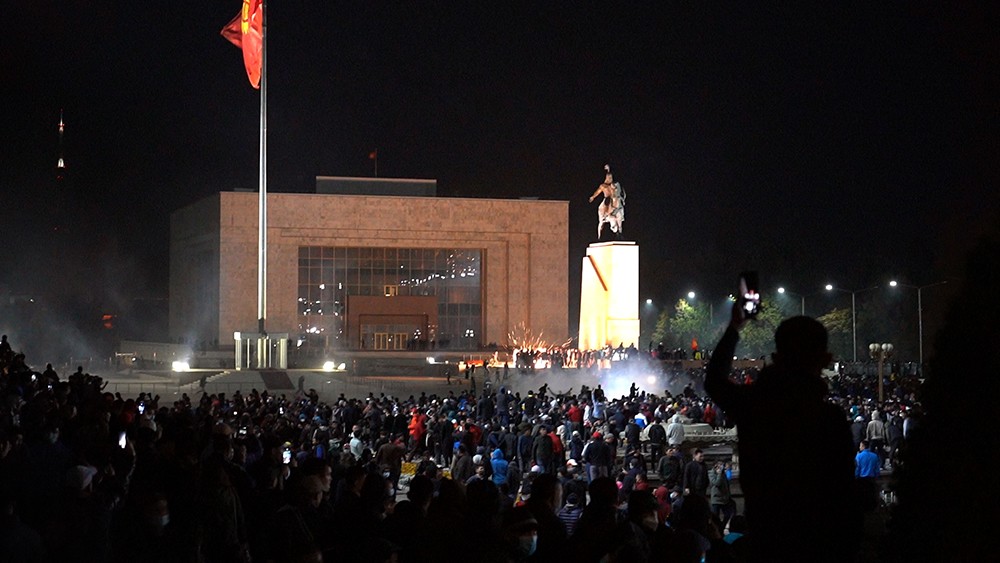
As Japarov later admitted in an interview with the Russian newspaper "Kommersant", he had been approaching this day for 10 years. He wasn't alone, he worked together with Kamchibek Tashiev and Talant Mamytov, who also took up leadership positions in the country in the wake of October protests. In 2012, all three of them were convicted for attempting to seize power when, as deputies of the JK of the KR, they organized a rally on October 3, 2012, to draw attention to Kumtor's problems and demanding the nationalization of the deposit. Two hours after the start of the meeting, the deputies unexpectedly called for the protesters to overthrow the current government, and literally climbed the fence. The "parkour politicians" were then sentenced to only a year and a half and had their convictions expunged some time later. (https://rus.azattyk.org/a/kyrgyzstan_ata_jurt_politics_trial/25068390.htm) l
Japarov received his second term for organizing riots in Karakol in the summer of 2013, when Emilbek Kaptagaev, the governor of the Issyk-Kul oblast at the time, was taken hostage. The demand of the rally was the same - the nationalization of Kumtor. Japarov was convicted in absentia for 11 years, as he left Kyrgyzstan and hid in Poland even before the verdict was announced. No information is available on what the current head of state did outside his home country, but there is a book published by him titled "10 Years in Politics". https://knews.kg/2014/08/16/sadyir-japarov-napisal-knigu-o-svoih-10-godah-v-politike/
Despite having a criminal record, Japarov returned to Kyrgyzstan in March 2017 to run in the following presidential election. However, he was arrested as soon as he crossed the border. He spent three and a half years in prison. During this period his son tragically died, then he lost his father and mother, and he attempted suicide.
He describes his time in prison as follows: "For three and a half years I was in direct contact with the common people. I created groups on Odnoklassniki, Facebook, Instagram. I collected people's contacts on WhatsApp and created more than 50 groups - one group holds up to 256 contacts. Through these groups I was spreading information about Kumtor, about my work. That's how I reached all the people in three and a half years. In prison you are free for 24 hours a day: there was plenty of free time. That's how I made the revolution from prison." (https://www.kommersant.ru/doc/4639707#id1957425 )
By the way, the use of communication devices in prisons of Kyrgyzstan is prohibited.
Violation after violation
After a crowd of supporters freed Sadyr Japarov from prison, in a matter of twenty-four hours he turned from an ordinary prisoner into the prime minister, and later into the acting president. For the first time, deputies approved his position on October 6 at an emergency meeting, convened not within the walls of Parliament, but in the hotel "Dostuk". But there was no quorum, and the public began to complain that the appointment was made illegally.
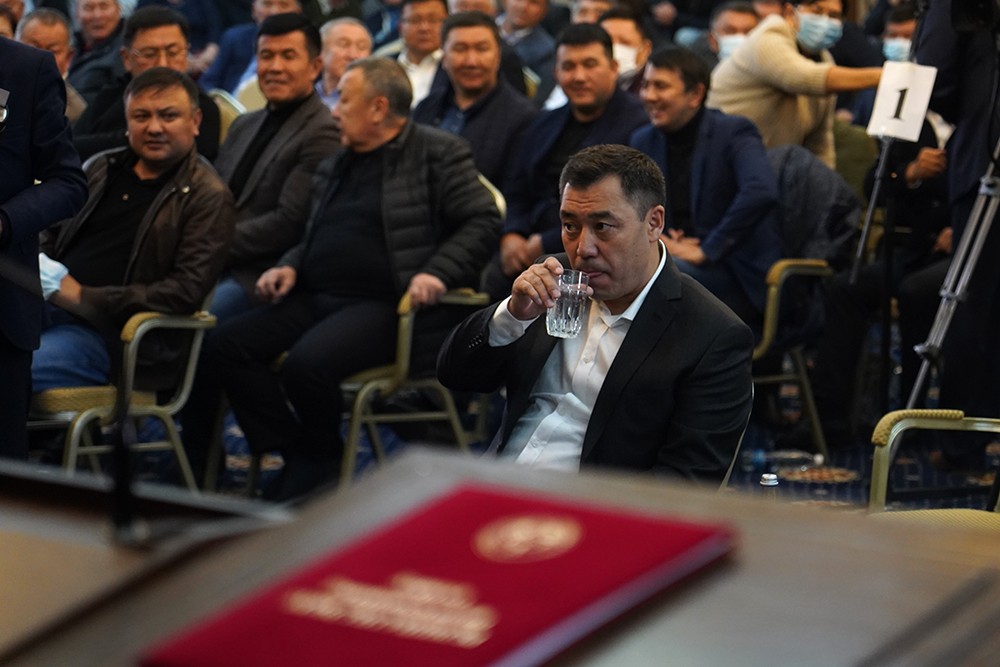
Moreover, the question about Japarov's outstanding convictions arose. Whereupon the information appeared in the media about the revision of the case on the newly discovered circumstances at the request of Sadyr Japarov's lawyer in the Supreme Court on October 6, 2020.
For the second time, Parliament considered the prime minister's candidacy on October 10, but even then there was no quorum. All the while, supporters of the future president stood on Bishkek's Old Square, influencing all the events to a certain extent, and their demands included the resignation of then-President Sooronbai Jeenbekov.
The final approval of the premier did not occur until the third time, on October 14. One of the deputies asked Japarov what happened to his criminal record. The answer was: "I'm clean before the law". However, according to lawyer Nurbek Toktakunov, Japarov was not telling the truth, because at that time there was no final decision on the expungement of the criminal record, and the case had only to be considered in court on newly discovered circumstances.
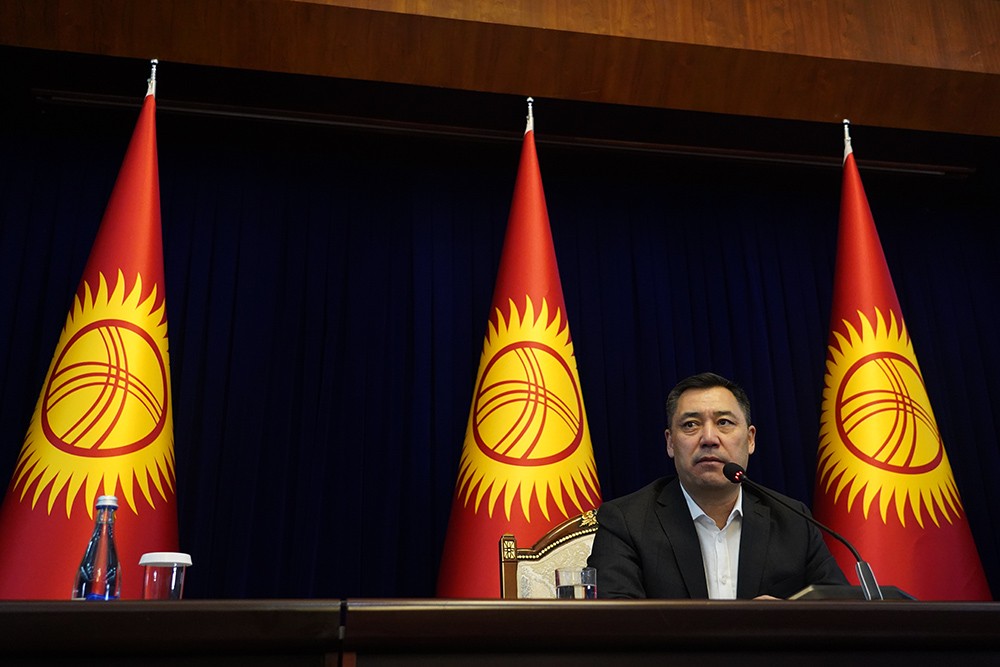
The decision to acquit him was not made until October 16, two days after being approved as prime minister.
"I can prove that the Supreme Court made a political decision in violation of the law. Thus, Sadyr Japarov never cleared himself of charges and convictions for attempted seizure of power. He is a convicted rebel who has no right to be a president," concluded lawyer Toktakunov. (https://vesti.kg/politika/item/80526-nurbek-toktakunov-verkhovnyj-sud-prinyal-politicheskoe-reshenie-v-otnoshenii-sadyra-Japarova.html)
After Japarov was confirmed as the head of the government, demands for Jeenbekov's resignation only intensified. Although all international partners made statements that they consider him the only legitimate politician, and he himself repeatedly stated in those days that he would not step down despite the pressure. However, on October 15, the president voluntarily resigned as head of state. What influenced his decision to leave is still unknown. But it is known that this happened after many hours of negotiations between him, Tashiev and Japarov and against the background of a rally of many thousands demanding the immediate resignation of Jeenbekov. This move by the president gave Prime Minister Japarov the opportunity to perform the duties of the head of the state.
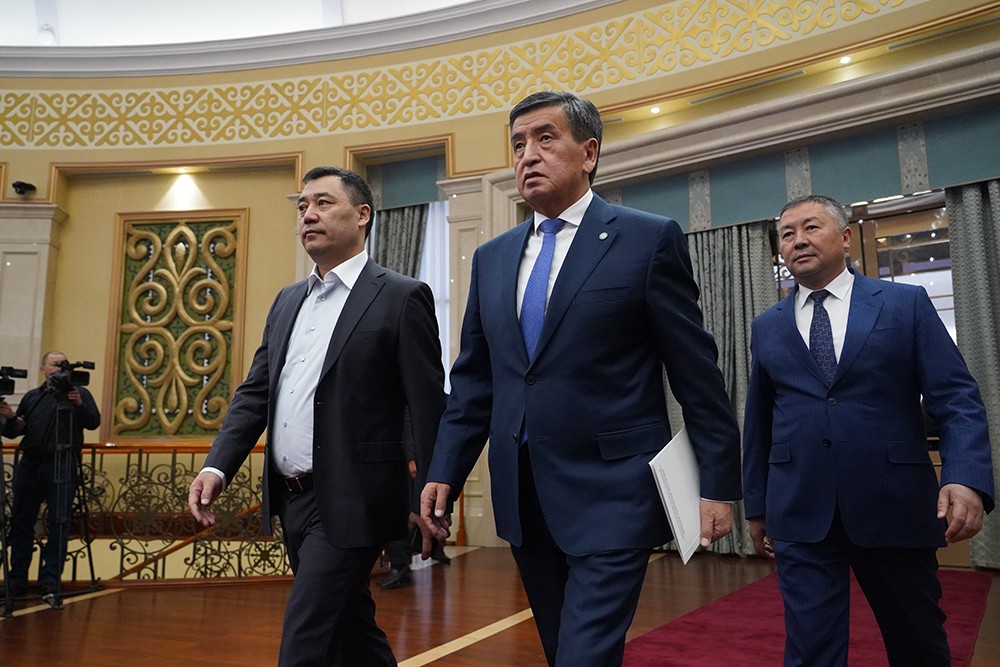
Further events in the country occurred with numerous violations of constitutional laws, but the Constitutional Chamber of the Supreme Court of Kyrgyzstan confirmed the legality of all actions.
In particular, new parliamentary elections were to be held first, since the term of office of the current Jogorku Kenesh ended on October 28, 2020. And the CEC even announced the date of the election - December 20. However, contrary to existing legal norms, the deputies extended their powers for 8 months and scheduled early presidential elections for January 10, 2021. The Venice Commission issued its opinion that the JK of the KR exceeded its authority by adopting these decisions. (https://24.kg/vlast/173600_venetsianskaya_komissiya_dala_svoe_zaklyuchenie_olegitimnosti_shestogo_sozyiva/)
On December 12, the CEC considered the application of three presidential candidates: Adakhan Madumarov, Kanatbek Isaev, and Bektur Asanov, who demanded that Japarov be excluded from the race because he violated the requirement of Article 68 of the country's Constitution whereby a person who was acting president has no right to run for president. This ban initially aimed at the inadmissibility of the use of administrative resources, which allows combining the positions of head of state and head of government.
However, the CEC left the application without satisfaction, accepting the explanation of Japarov's representative Alexander Moshchin, who stated that before he applied to the CEC for participation in the elections, Sadyr Japarov publicly stated that he resigned as acting president under Article 66 of the KR Constitution, and therefore at that time he was not the head of state. (https://shailoo.gov.kg/ru/npacik/Resheniya_CIK_KRKR_BShKnyn_chechimderi/290-o-zayavlenii-k-madumarova-kk-isaeva-basanova/ )
"Japarov is our lantern!”
Despite the violations of the law and bold promises of rapid economic growth and purging the country of corruption, Sadyr Japarov immediately enjoyed enormous popularity among voters and managed to seriously outperform his 16 opponents in the elections.
We asked the experts why Sadyr Japarov became so popular that elderly women in the villages lovingly called him "our lantern"?
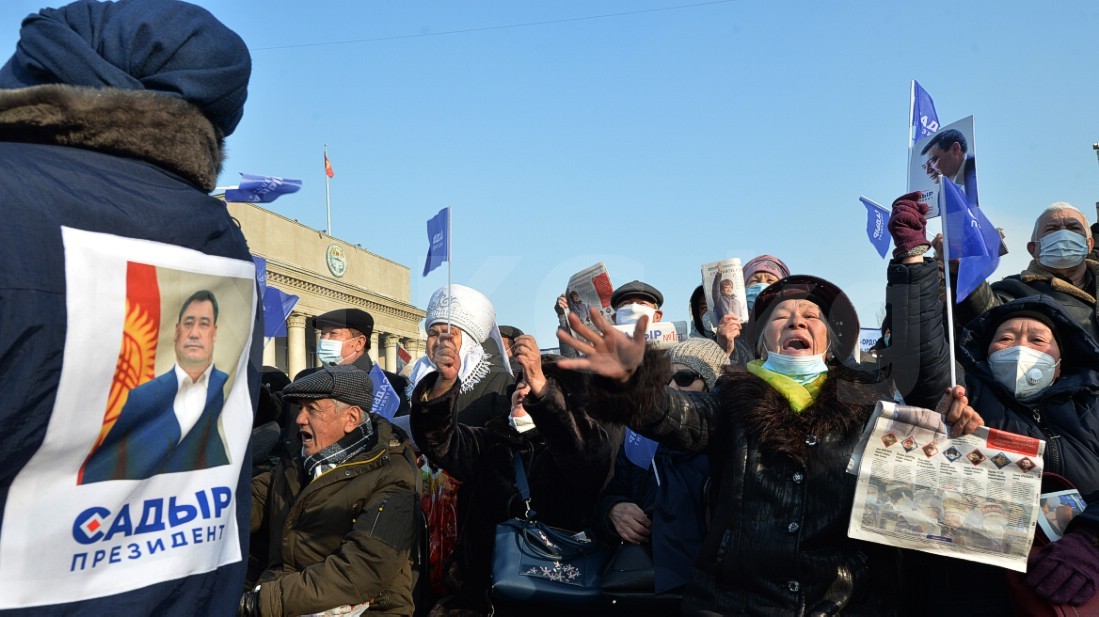
Medet Tulegenov, a political analyst, notes: "One of the reasons has to do with the fact that among the politicians who appeared after October 5, there were either old, discredited politicians or completely new ones who were not known to the people, especially in the regions. That is why it was easy for Japarov to win sympathy, given the weakness of his competitors. The second reason is that there has long been a messianic attitude in society that someone will come and quickly put everything on the right track. And Japarov was lucky to fall into this stream of expectations. The established image also played a role: a sufferer, a political prisoner, with the family that had suffered... He tried to present himself as a fighter for truth, for Kumtor - this also appealed to the electorate. Everything coincided, so many people, if you put aside the social media trolls, sincerely believed him."
"Remember how he was greeted in the square after his release from prison on the night of October 5 to 6? The people literally proclaimed: "Khan is coming! - says Nargiza Nanakeeva, head of the "Politmer.kg" platform. - My mom voted for Sadyr Japarov, as she was subscribed to his groups and pages on social networks, wrote posts and comments in his support, and periodically received various videos about Sadyr Japarov on WhatsApp. One morning she read somewhere that Sadyr Japarov had passed away. I told her it was a fake. You should have seen her face: she was begging God that the news was really fake. "God save Sadyr from his enemies", she says it several times a day. She really adores him."
By Nanakeeva's observation, for ordinary people Sadyr Japarov is "a national hero, a victim of political repression, a fighter for the idea, a martyr who lost loved ones during his imprisonment for defending the interests of his homeland."
Samar Syrgabaev, a candidate of sociological sciences and a researcher, argues that the decisive vote in all elections belongs to the rural electorate, the so-called "inland people".
According to the National Statistical Committee, during the last century in Kyrgyzstan, more than 65% of the population permanently lived in rural areas and about 33-35% in urban locations. During the period of sovereignty, despite the seemingly strong urbanization and concentration of the population in large cities, particularly in Bishkek and Osh, the above proportions have been maintained. In other words, the vast majority of our citizens continue to live in the villages, preserving and cultivating traditional values, just as they did a hundred years ago. I would refer to this part of the population as the "inland people". This part of the population constitutes the electorate of S. Japarov. Maybe he is not as educated and modernized as urban residents, he does not possess critical thinking and is not as deeply affected by modern processes of liberalization and globalization, but he ultimately determines the choice of the country's general course," says Samar Syrgabayev. (http://nlkg.kg/ru/projects/sociologiya/kogda-zhdat-rutinizacii-xarizmy-Japarova)
A resounding victory with low turnout
According to the official CEC data, Sadyr Japarov won 79.2% of the votes of those who came to vote, or 39.16% of those eligible to vote. This is one of the lowest turnout in the history of elections in Kyrgyzstan, which probably confirms the claim of experts that the new president was mainly voted for by the rural population; urban residents preferred not to go to the polls, following the events on social networks.
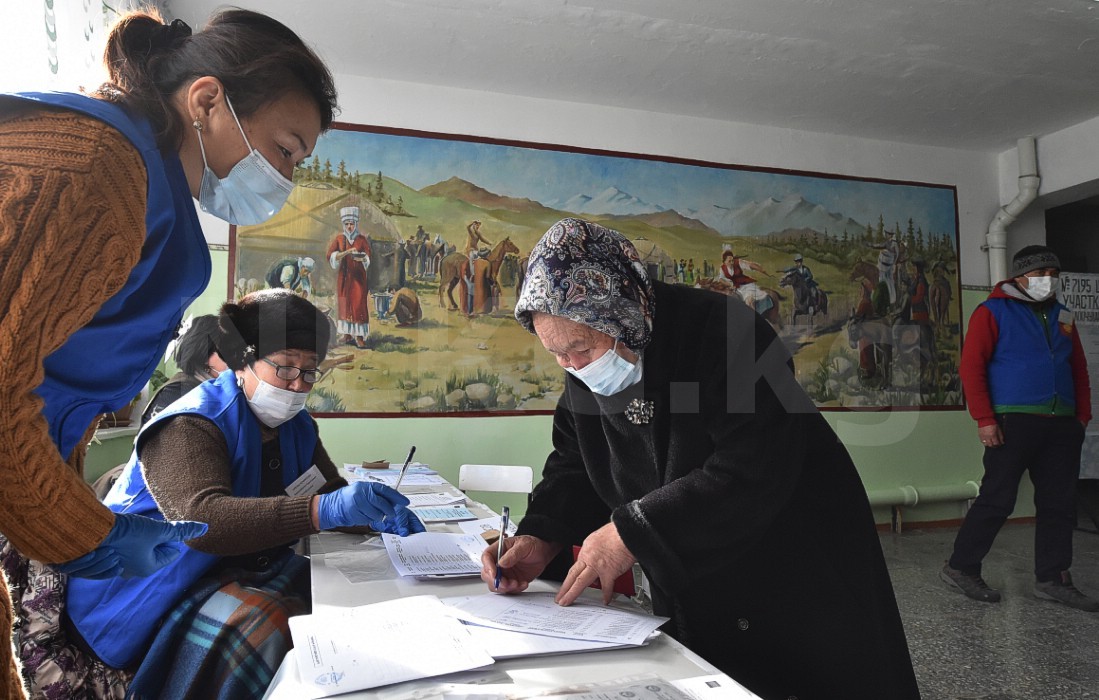
But this was not the only reason for the low turnout; there are more serious reasons, about which Samar Syrgabayev said:
"First, the lack of trust in government. Our sociological measurements over the past ten years have consistently recorded a growing lack of public trust in the government. People began to trust imams more than the state institutions. The trust resource was dwindling with each year, and it was exhausted completely during the pandemic with the unprecedented mass mortality.
Secondly, the post-revolutionary state of turbulence and uncertainty, amplified by the post-revolutionary depression and economic stagnation, naturally affected the apolitical nature of social attitudes in society and gave rise to absenteeism (avoidance of voting).
Third, the dominance of the "inland people" and the sense of a predetermined outcome when the winner is already known. In this respect, one could argue that the sociological pattern of the "spiral of silence" has worked, whereby people surrender to the majority for fear of social "isolation," and the spiral gradually spirals upward, affecting ever larger segments of the population.
Fourth, the abolition of the infamous Form No. 2, which deprived a sizable portion of internal migrants of the opportunity to vote.
Fifth, there was practically no vote-buying, except for isolated instances, which has always been an effective method of the financial mobilization of the electorate," says sociologist Samar Syrgabayev.
Non-alternative elections?
As strange as it may seem, Sadyr Japarov clearly showed that the candidates in power in Kyrgyzstan can always expect to win elections by putting their rivals in a relatively unequal position in advance and making the elections essentially non-alternative. The point is that even if the candidate himself gives up all privileges, the most powerful apparatus will continue to work for him, access to resources will a priori be open, and there will always be those who want to please in advance. That, in general, is confirmed by the findings of observers.
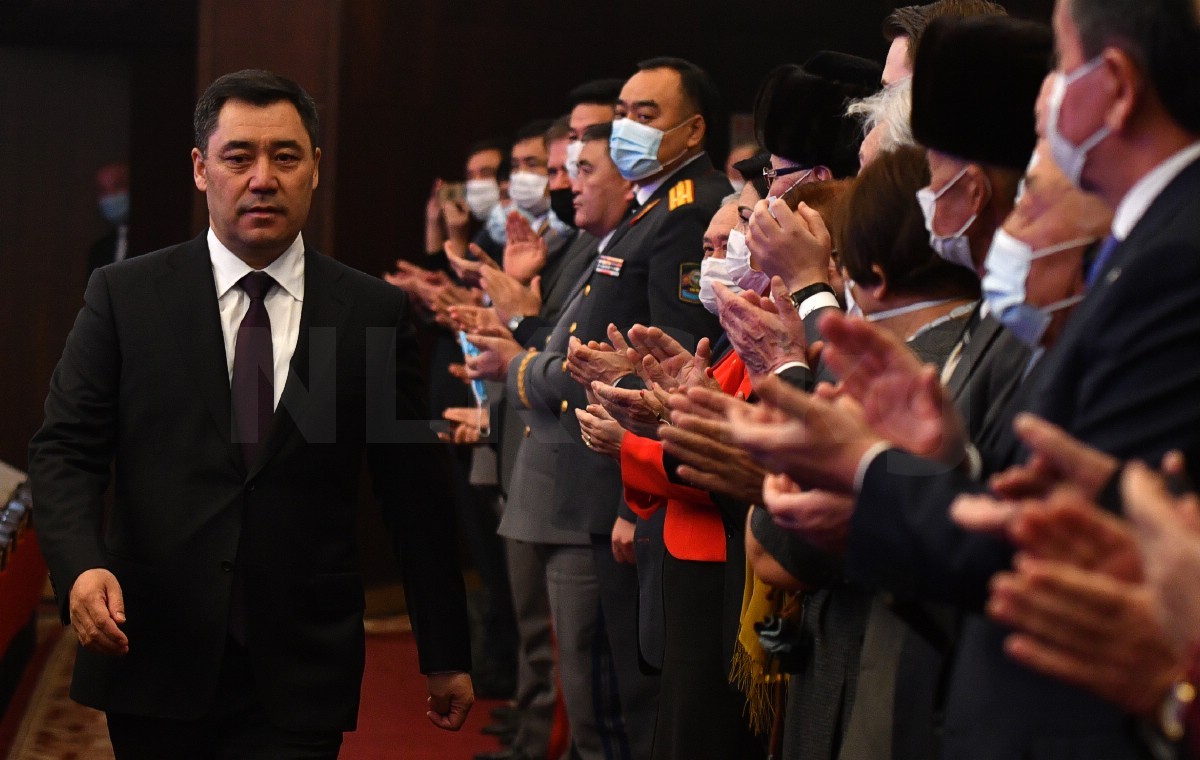
In the preliminary statement on the results of the independent observation of the early presidential election in the Kyrgyz Republic, the observers of the Common Cause PF note: "The election campaign for the early presidential election was held without any tough competition. The principle of equality was not fully ensured for all candidates. Some candidates noted pressure on canvassers in Issyk-Kul, Chui, and Osh oblasts. At the same time, observers point out that of 17 candidates the most active campaign was carried out by candidates Sadyr Japarov, Babyrzhan Tolbaev, Adakhan Madumarov and Kursan Asanov, and the candidate Sadyr Japarov had the largest number of headquarters, billboards, canvassers and the largest election fund.
Each candidate noted in various media and on their social media pages about unequal campaign conditions, in particular, complaints about this came from the headquarters of Madumarov and Kasenov. Violations were also recorded by the Common Cause PF.
During the pre-election period, the staff of the Common Cause Public Foundation held meetings with 16 of the 18 candidates for the presidency of the Kyrgyz Republic or their representatives.
"The majority of candidates indicated problems related to the abuse of administrative resources in Bishkek city, Osh and Jalal-Abad oblasts. In particular, the candidates were concerned about the fact that in the Issyk-Kul region (in Karakol city and Ton district) candidates other than S. Japarov were not allowed to open regional headquarters. This is the first time since the country's independence that many candidates have not been able to hold meetings with voters in this region, with the exception of candidate A. Kasenov. Candidate A. Madumarov, in an address on the air of PBC, reported about serious threats to the representatives of his headquarters and canvassers in the Issyk-Kul oblast. Most of the candidates said that there was intimidation of canvassers, who do not work for the headquarters of S. Japarov," the statement said. (https://www.commoncause.kg/news/115 )
Factcheck.kg journalists found out that in the trips around the regions candidate Japarov was accompanied by the state security guards wearing clothes with the candidate's symbols (https://factcheck.kg/obman-i-lozh-shtaba-sadyra-Japarova-v-otvet-na-rassledovanie-factcheck-kg/). That fact is a violation of Article 87-1 of the Misdemeanors Code, "Abuse of Administrative Resources."
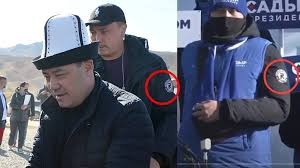
The press service of the SCNS, which includes the State Guard, explained that "in accordance with Article 8 of the Law of the Kyrgyz Republic 'On State Guard', persons holding public office, including the prime minister, are provided with the state guard during their term of office."
"The granting of state protection ceases when the authority of the object of state protection is terminated. At present, Prime Minister Sadyr Japarov has suspended his powers in connection with his participation in the elections, but taking into account the principle of continuity stipulated by Article 4 of the above-mentioned law, the provision of state guard protection has not been terminated". ( https://vesti.kg/politika/item/79300-sadyr-Japarov-slozhiv-polnomochiya-ne-tolko-zhivet-v-gosrezidentsii-u-nego-i-gosokhrana-ostalas.html)
Political analyst Medet Tulegenov believes that Japarov and his team, who came to power in October, quickly managed to take control of all the resources that his predecessors had, which, in particular, ensured victory in the parliamentary elections for two pro-government parties and left the opposition on the sidelines.
"It seems to me that Japarov became the sole shareholder of these all sorts of resources, which were aimed at ensuring his victory in the presidential election. Accordingly, this gave him a big advantage - the money, logistics, and staff work simply flowed from the parliamentary to the presidential election. Human resources also flowed to Japarov; canvassers, journalists, and social media trolls started working very actively for him," Tulegenov said.
According to the political analyst, an important role was also played by the ability and ability of Japarov's staff to ensure the support of their candidate from various members of the political elite, when after a cup of tea the politician loudly declared that he supported Japarov. This is what happened to Sadyk Sher Niyaz, Dastan Bekeshev, and a little earlier to Omurbek Suvanaliev.
“It is not known what methods were used. But this has played into Japarov's image", the political analyst stated.
What were the promises?
The promises he made during the campaign played a major role in Japarov's victory. Although they were not new and were quite in line with the agenda of Kyrgyzstan, they were nevertheless very bold in terms of deadlines.
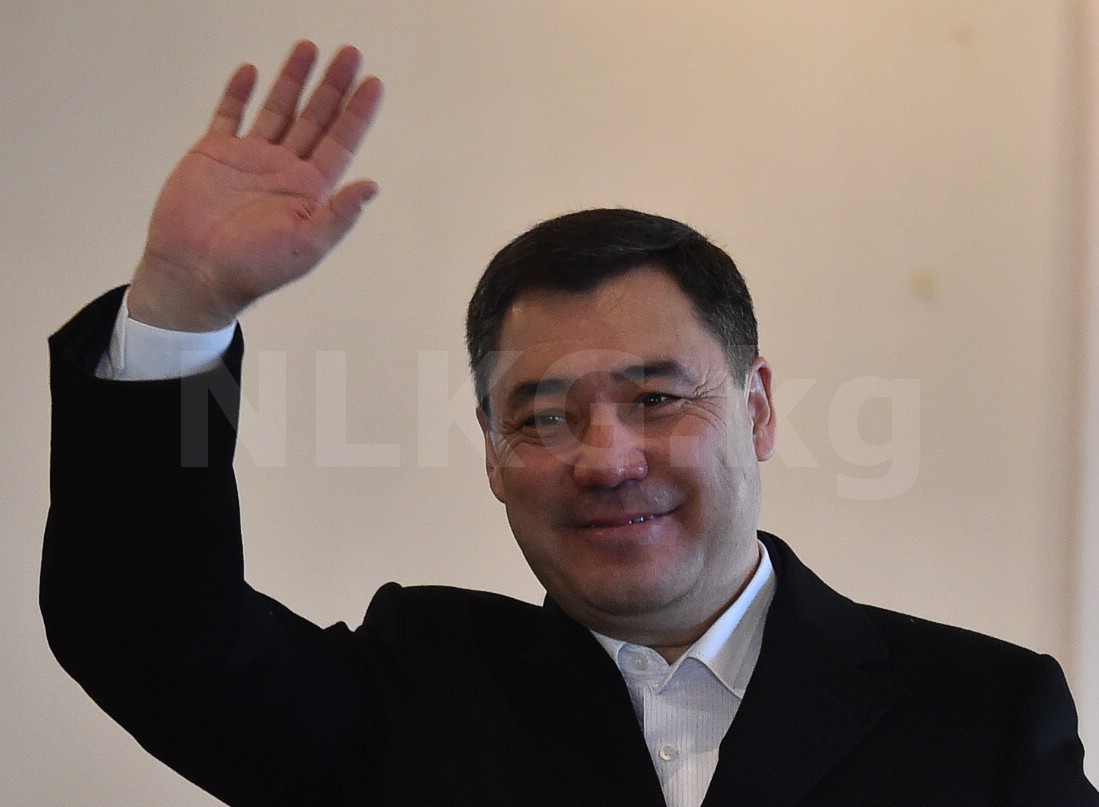
Nargiza Nanakeeva, head of Politmer.kg, a platform that has been monitoring the election promises of Kyrgyzstan's politicians since 2011, said, "We keep track of politicians' promises, including those of newly elected President Sadyr Japarov. Sadyr Japarov has more than 40 promises on his website in text and video. Naturally, most of his promises are similar to those of previous presidents. For example, Sadyr Japarov also promises to fight corruption, reform the judicial system, attract young people into the public service, pay off the country's foreign debt, reduce the number of government officials and conduct lustration, and so on.
Here are some of the promises:
"To pay off foreign debt in four years"
Japarov said this at a press conference after the election on January 10. "I can't promise that we will pay it off in the near future, because the first two or three years will be very difficult; there are problems in the economy, energy industry, and there is no political stability. But in 3-4 years we will have a full opportunity to pay our debts," he said.
"Independent judicial system”
If the people elect me president, then there will be no pressure on the courts from the "White House", we will ensure this. We have enough strength and will to do this, " says the campaign material dated December 25, 2020.
"Kumtor will work 100% in the interest of the people."
Sadyr Japarov has promised to nationalize Kumtor since 2012. However, after his appointment as prime minister, he changed his mind. During a press conference on October 14, 2020, he stated that there were no gold reserves left at the deposit and, therefore, he changed his mind and believes that it is no longer worth nationalizing Kumtor. Yet, Factcheck.kg caught Japarov in a lie regarding this statement. The value of gold reserves by the beginning of 2019 was more than 5 billion U.S. dollars.
"Lustration”
According to Japarov's election program, the State Personnel Service shall conduct lustration measures, and in 5 years the personnel of law enforcement agencies shall be renewed by 50%.
“To protect business from crime”
"We will protect business from crime and from officials who were associated with crime," he said at a meeting of the Business Development and Investment Council on October 23, 2020, when he was Prime Minister.
According to political analyst Medet Tulegenov, some promises may not be feasible, since there is no clear plan on how to implement them. In particular, this applies to the economy and the fight against corruption:
"Even in view of Japarov's current popularity and the fact that he has carte blanche, it is still unclear how it will be implemented. And as time goes on, it will be even harder. By then, the opposition will become active, his image will be tarnished, and discontent will accumulate. Accordingly, the likelihood of promises being fulfilled diminishes.
At the same time, the expert says that a number of pre-election promises are quite real and achievable, but they may not be carried out without pressure, in particular, the constitutional reform and the change of the political system.
What kind of future awaits the newly elected president of Kyrgyzstan, who came to power in the most economically difficult period for the country, on a wave of general disappointment of the people, through popularity on social networks and through populism?
Sociologist Samar Syrgabaev believes that "it's difficult to predict the future of the new leader, but one thing is clear - the resource of people's trust, repeatedly strengthened by the synergy of mass enthusiasm and hope for a better future, will last one or two years at most, given our deplorable economic condition."
"Then there will be a routinization of charisma, and other resources will need to be brought into play. I believe that meritocracy and expertocracy should become these main resources. We've already seen everything else," the sociologist concludes.
The material was prepared with the assistance of the Common Cause Public Foundation. The editorial team of "Novye litsa" thanks the Foundation for providing information on the nonpartisan observation of the early presidential election in the Kyrgyz Republic.
The "Novye Litsa" publication would like to thank the Common Cause Public Foundation for its assistance in preparing this material, as well as all the experts who shared their opinions, because they care about the future of our country.
Leila Saralaeva
Photo credits: Vyacheslav Oseledko and Abylai Saralaev









